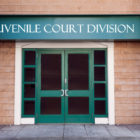
“They can’t do that!”
This quickly became my mantra when I started as a juvenile defender nearly a year ago. My colleagues heard it so often they joked about recording me and just playing it back while I was observing court proceedings so that I wouldn’t have to speak. Unfamiliar with the differences between how the criminal justice system treats juvenile and adult offenders, I was clearly unprepared for some of the things I witnessed when I first arrived in juvenile court. You see, juvenile courts are quasi-criminal, meaning many of the aspects I expected to see in a criminal court are present, but the result of juvenile delinquency proceedings is supposed to be more rehabilitative than punitive, and “in the best interest of the child.”
What I learned this to mean is that prosecutors, judges, and a state’s department of juvenile justice have much more latitude to make recommendations for a child’s “best interests.” Because of this latitude, I have actually heard a judge say, “Don’t even think about requesting bond until you tell us where the weapon is,” at a detention hearing. What happened to the presumption of innocence, or the right to avoid self-incrimination?







